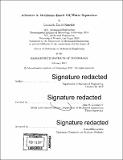| dc.contributor.advisor | John H. Lienhard, V. | en_US |
| dc.contributor.author | Banchik, Leonardo David | en_US |
| dc.contributor.other | Massachusetts Institute of Technology. Department of Mechanical Engineering. | en_US |
| dc.date.accessioned | 2017-05-11T19:57:26Z | |
| dc.date.available | 2017-05-11T19:57:26Z | |
| dc.date.copyright | 2017 | en_US |
| dc.date.issued | 2017 | en_US |
| dc.identifier.uri | http://hdl.handle.net/1721.1/108950 | |
| dc.description | Thesis: Ph. D., Massachusetts Institute of Technology, Department of Mechanical Engineering, 2017. | en_US |
| dc.description | Cataloged from student-submitted PDF version of thesis. | en_US |
| dc.description | Includes bibliographical references (pages 117-124). | en_US |
| dc.description.abstract | Oil is a widespread pollutant from oil spills to industrial oily wastewater in the oil and gas, metalworking, textile and paper, food processing, cosmetics, and pharmaceutical industries. A wastewater of particular concern is produced water, an oily waste stream from hydrocarbon extraction activities. Worldwide, over 2.4 billion US gallons of produced water is generated every day. Membrane technologies have emerged as the preferred method for treating these wastewaters; this has allowed operators to reclaim and reuse fresh water for potable, industrial, and agricultural use and to meet waste discharge regulations. Yet, despite their technological predominance, membranes can become severely fouled and irreversibly damaged when bulk and small stabilized oil droplets, emulsions, are present in intake streams. In this thesis, we seek to mitigate these deleterious effects through several means. First we seek to better understand fouling by oil-in-water emulsions on conventional polymeric ultrafiltration membranes. We investigate the decrease in water production over time using model and actual produced water samples with varying solution zeta potentials and make meaningful recommendations to operators based on our observations. Next, we develop a robust multifunctional membrane which can in one step degrade organic pollutants and separate bulk and surfactant-stabilized oil/water mixtures while achieving high fluxes, high oil rejection, and high degradation efficiencies. Finally, we investigate the potential of novel in-air hydrophilic/oleophobic microfiltration and reverse osmosis membranes for their anti-oil fouling performance relative to conventional hydrophilic/oleophilic membranes. Contrary to claims in literature of superior performance, we find that in-air oleophobicity does not aid in underwater anti-fouling due to surface reconstruction of mobile perfluoroalkyl chains in the presence of water. Based on these observations, we discuss opportunities for future research on oil anti-fouling membranes using fluorinated moieties. | en_US |
| dc.description.statementofresponsibility | by Leonardo David Banchik. | en_US |
| dc.format.extent | 124 pages | en_US |
| dc.language.iso | eng | en_US |
| dc.publisher | Massachusetts Institute of Technology | en_US |
| dc.rights | MIT theses are protected by copyright. They may be viewed, downloaded, or printed from this source but further reproduction or distribution in any format is prohibited without written permission. | en_US |
| dc.rights.uri | http://dspace.mit.edu/handle/1721.1/7582 | en_US |
| dc.subject | Mechanical Engineering. | en_US |
| dc.title | Advances in membrane-based oil/water separation | en_US |
| dc.type | Thesis | en_US |
| dc.description.degree | Ph. D. | en_US |
| dc.contributor.department | Massachusetts Institute of Technology. Department of Mechanical Engineering | |
| dc.identifier.oclc | 986242740 | en_US |
